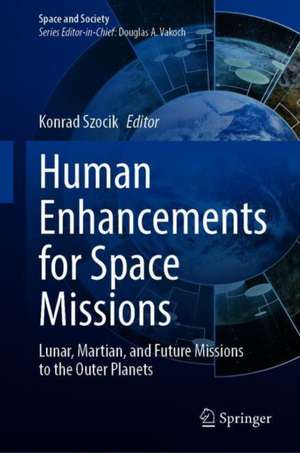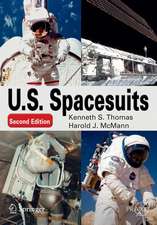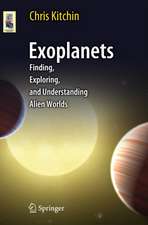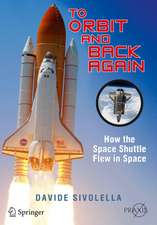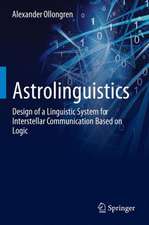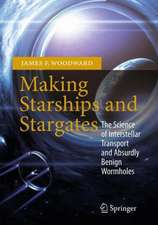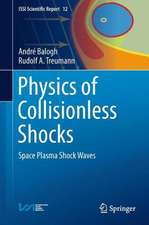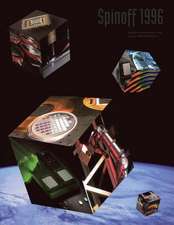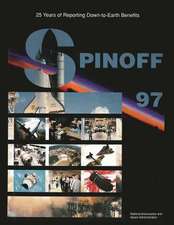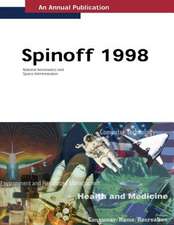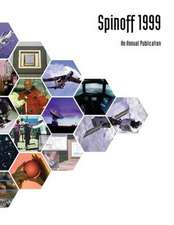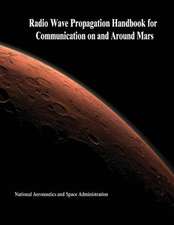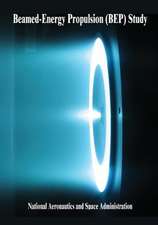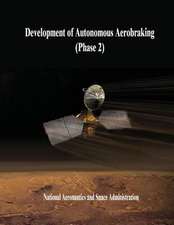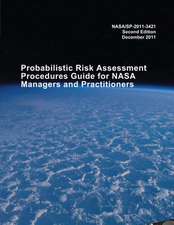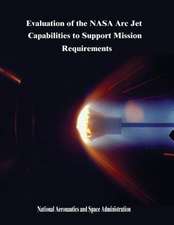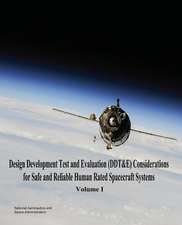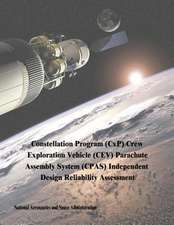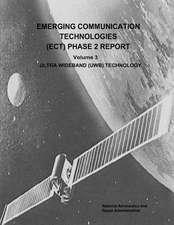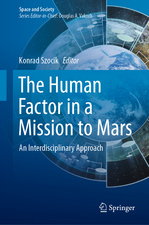Human Enhancements for Space Missions: Lunar, Martian, and Future Missions to the Outer Planets: Space and Society
Editat de Konrad Szociken Limba Engleză Hardback – 8 aug 2020
| Toate formatele și edițiile | Preț | Express |
|---|---|---|
| Paperback (1) | 781.77 lei 6-8 săpt. | |
| Springer International Publishing – 9 aug 2021 | 781.77 lei 6-8 săpt. | |
| Hardback (1) | 787.78 lei 6-8 săpt. | |
| Springer International Publishing – 8 aug 2020 | 787.78 lei 6-8 săpt. |
Din seria Space and Society
- 20%
 Preț: 692.49 lei
Preț: 692.49 lei - 20%
 Preț: 763.92 lei
Preț: 763.92 lei - 15%
 Preț: 642.68 lei
Preț: 642.68 lei - 15%
 Preț: 643.84 lei
Preț: 643.84 lei -
 Preț: 389.11 lei
Preț: 389.11 lei - 18%
 Preț: 949.90 lei
Preț: 949.90 lei -
 Preț: 385.25 lei
Preț: 385.25 lei - 18%
 Preț: 784.92 lei
Preț: 784.92 lei - 18%
 Preț: 1115.94 lei
Preț: 1115.94 lei - 18%
 Preț: 893.84 lei
Preț: 893.84 lei - 18%
 Preț: 731.91 lei
Preț: 731.91 lei - 18%
 Preț: 1846.28 lei
Preț: 1846.28 lei - 24%
 Preț: 725.96 lei
Preț: 725.96 lei - 18%
 Preț: 949.73 lei
Preț: 949.73 lei - 18%
 Preț: 897.33 lei
Preț: 897.33 lei - 18%
 Preț: 954.62 lei
Preț: 954.62 lei - 15%
 Preț: 700.75 lei
Preț: 700.75 lei - 24%
 Preț: 719.82 lei
Preț: 719.82 lei - 18%
 Preț: 781.77 lei
Preț: 781.77 lei - 18%
 Preț: 997.88 lei
Preț: 997.88 lei - 18%
 Preț: 725.75 lei
Preț: 725.75 lei - 24%
 Preț: 737.60 lei
Preț: 737.60 lei - 23%
 Preț: 842.19 lei
Preț: 842.19 lei
Preț: 787.78 lei
Preț vechi: 960.71 lei
-18% Nou
Puncte Express: 1182
Preț estimativ în valută:
150.74€ • 157.38$ • 124.76£
150.74€ • 157.38$ • 124.76£
Carte tipărită la comandă
Livrare economică 05-19 aprilie
Preluare comenzi: 021 569.72.76
Specificații
ISBN-13: 9783030420352
ISBN-10: 3030420353
Pagini: 291
Ilustrații: XIV, 291 p. 15 illus., 13 illus. in color.
Dimensiuni: 155 x 235 x 25 mm
Greutate: 0.61 kg
Ediția:1st ed. 2020
Editura: Springer International Publishing
Colecția Springer
Seria Space and Society
Locul publicării:Cham, Switzerland
ISBN-10: 3030420353
Pagini: 291
Ilustrații: XIV, 291 p. 15 illus., 13 illus. in color.
Dimensiuni: 155 x 235 x 25 mm
Greutate: 0.61 kg
Ediția:1st ed. 2020
Editura: Springer International Publishing
Colecția Springer
Seria Space and Society
Locul publicării:Cham, Switzerland
Cuprins
Section I. Human Enhancements: Biological, Medical, and IT Perspectives.- Margaret Boone Rappaport and Christopher Corbally: Normalizing the Paradigm on Human Enhancements.- Martin Braddock: Challenges and Opportunities for Colonisation and Civilisation Build and the Potential for Human Enhancements.- Steven Abood: Crossing the Transhuman Rubicon: When do enhancements change our definition of human?.- Section II. Human Enhancements: Philosophical and Moral Perspectives.- Konrad Szocik and Chris Impey: Human enhancement and Mars settlement – biological necessity or science-fiction?.- Ziba Norman and Michael Reiss: Volitional Evolution: Does A Mission to Mars Alter the Balance in Favour of Enhancement?.- Koji Tachibana: Human enhancement in space and the value of survival.- Anthony Milligan: The Ethical Problems of Life Extension in Space.- Gonzalo Munévar: Science and Ethics in the Human-Enhanced Exploration of Mars.- Cameron Smith: Prediction and Prescription in Mars Settlement Studies.- Héctor Velázquez: Mission to Mars: Enhancing our concept of human home?.- Klara Anna Capova: Homo extremophilaeus. Terrestrial and extra-terrestrial stories of extreme survival and their relevance for manned mission to Mars.- Laura Benitez Valero: Spatial Colonization and xenointersections.- Raquel Cascales: Cyborgs and Cyborgism: The Present Human Enhancement as a Projection of the Future.- Rosa Fernandez, Urtasun: Myths of the Future in Mars.- Jacques Arnould: Promise of heaven. Space, human enhancement, and religion.- Luis Torró Ferrero: Some theological considerations about human enhancement in the missions to the outer planets.
Notă biografică
Konrad Szocik (born 1985 in Żary, Poland) received his PhD in Philosophy (Faculty of Philosophy, Jagiellonian University in Cracow, Poland). Currently, he is assistant professor at the University of Information Technology and Management in Rzeszów, and editor of the “Studia Humana” journal. Research areas include space philosophy and space ethics (mainly the idea of human enhancement for space), and cognitive and evolutionary study of religion.
Textul de pe ultima copertă
This book presents a collection of chapters, which address various contexts and challenges of the idea of human enhancement for the purposes of human space missions. The authors discuss pros and cons of mostly biological enhancement of human astronauts operating in hostile space environments, but also ethical and theological aspects are addressed. In contrast to the idea and program of human enhancement on Earth, human enhancement in space is considered a serious and necessary option. This book aims at scholars in the following fields: ethics and philosophy, space policy, public policy, as well as biologists and psychologists.
Caracteristici
A unique book discussing the idea of human enhancement for purposes of space missions The best guide in rationale and the future directions for human space missions Points out radical ethical challenges of manned deep-space missions
